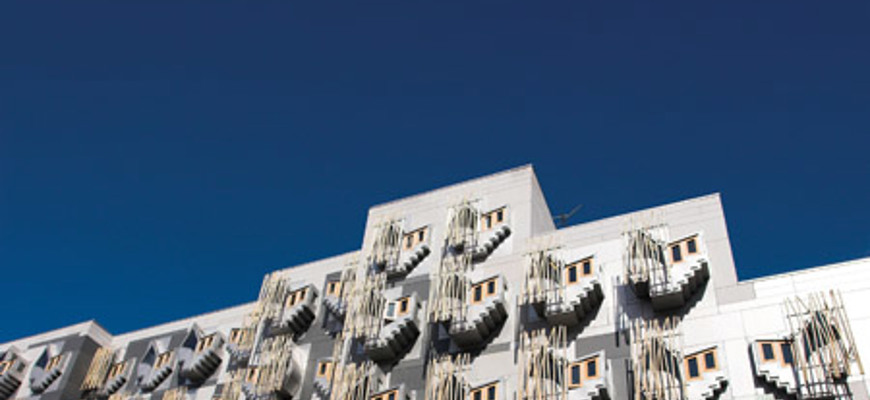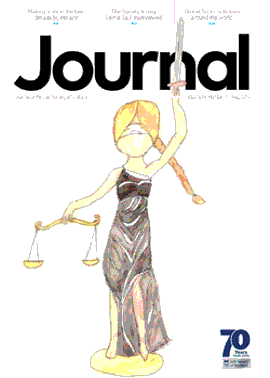Holyrood at 20: turbulent times or settled state?

The democratic deficit. Scotland’s settled state. Plurality in politics. These were some of the threads drawn together at the Law Society of Scotland’s conference discussing 20 years of devolution and the Scottish Parliament, on Monday 24 June. A synthesis of law, policy and politics, distinguished speakers including the First Minister Nicola Sturgeon and Sir John Curtice explored Scotland’s evolution during the last 20 years, and shared their hopes for the future. A flavour of some of the speeches is given here.
In search of consensus
Henry McLeish, former First Minister of Scotland, set the tone for the day as he recalled the buzz and excitement when the Scottish Parliament opened in 1999, describing its progress over the last 20 years as an “enormous success”. Adding that the best days of the Parliament were yet to come, he welcomed the shift in discussion from questioning the necessity of its existence to promoting its improvement and accountability.
Against the backdrop of the current turbulent political landscape, McLeish described the public as “volatile, unforgiving, resentful and angry”, and equated Brexit to no less than “collective national self-harm”. It was in this context that he considered the settled will in Scotland. There is no settled will, according to McLeish. Devolution was never a settled issue. Devolution was not viewed as a radical solution nor a big idea in 1997. It was merely seen as a solution to a problem.
Where does this leave the future of the institution? McLeish criticised the tribalism in the Scottish Parliament and urged that the focus be returned to the bigger picture: what kind of Scotland do we want, and how do we achieve this? What kind of freedom do we want?
McLeish’s vision for the future? A Scottish Parliament where coalition, compromise and cooperation become a reality. A Parliament that is consensus-building, with more powers particularly in the spheres of immigration and the economy. McLeish concedes that the Scotland question cannot be solved overnight, but the future is positive. Advocating a new, more powerful Scotland, he impelled the Scottish Parliament to reconsider its position internally and internationally as we look towards the next 20 years of devolution and more.
Polling trends: what has Holyrood changed?
Sir John Curtice considered two decades of the Scottish Parliament from a psephologist’s point of view. As the metric for determining whether devolution has delivered, he focused on what he believes were the three hopes and aspirations for the Parliament in 1999: to strengthen voters’ engagement with the political system; to develop a more plural politics; and to quash the independence movement.
Of the first aspiration, he explained that although Holyrood is increasingly seen as the Parliament with the most influence in Scotland, this has not translated into votes. Turnout for the election of MSPs has been consistently less than that for UK general elections. Secondly, Curtice noted that the Scottish Parliament was intended to be more representative in terms of gender and race, and to result in coalitions and compromise. With one party dominating Parliament, and the only minority party to have been able to make a sustained entrance being the Scottish Greens, this had largely failed. In addition, Holyrood is barely achieving more than Westminster in terms of gender equality. Ultimately, he believes that the system is more closed than the position in 1999.
Finally, as to whether the creation of the Scottish Parliament had killed the independence movement, the answer was obvious. Curtice explained that the Scottish National Party has mobilised a sense of Scottish identity to gain support in Scottish parliamentary elections, and more recently in Westminster, so as to narrow the Holyrood/Westminster gap to its advantage. Asked whether the SNP’s supposed benchmark for holding another referendum on independence (being 60% of the electorate favouring it over the course of a year) put too much power in the hands of pollsters, Curtice replied that “polls should be taken and not inhaled”. Much like Scotland’s political history, nothing is certain.
Westminster: friend or foe?
Praising the Scottish Parliament as an “institution which people to look to, to reflect their priorities, values and dreams”, First Minister Nicola Sturgeon said it had gained the trust and respect of Scots as a result of its wide programme of legislative reform over the past two decades. “By using our existing powers wisely, we have continually made the case for gaining new ones”, she stated, citing the imminent establishment of a Scottish National Investment Bank and a citizens’ assembly.
However, she warned that the “internal market” brought about following the Brexit referendum was a threat to the Scottish Parliament’s powers and progress. She denounced the EU (Withdrawal) Act of 2018 as a clear destabilisation of the Sewel convention, having been ratified despite a lack of support from the Scottish Parliament. In addition, she criticised the UK Government for not recognising Scotland as “a distinct political community”, asserting that “devolution has had virtually no effect on the mindsets at Westminster” and that “intergovernmental relations reflect an obvious tension”. Brexit in particular, she said, had “reanimated concerns about the democratic deficit”, intensifying the need for an independent Scotland.
In sharp contrast, Cabinet Minister David Lidington spoke of the UK Government’s vision for Scotland. It hopes that a devolved Scotland will continue to prosper within the framework of a strong United Kingdom, not as something to be merely tolerated, nor as a means of facilitating independence, but as a “settled state”. He spoke of the productive inter-governmental relations between the devolved nations and Westminster, citing the Joint Ministerial Committee on EU Negotiations which now aims to meet monthly, and the First Minister’s attendance at meetings of the UK Cabinet to discuss preparations for Brexit.
In addition, while he recognised the importance of acknowledging areas of disagreement, he said that maintaining “regular, candid and genuine dialogue” was key to the successful relationship between the two institutions. He concluded that the existence of two governments “each with its own respective competencies, both legitimate, is something that we need to articulate with greater clarity and more confidence”, and urged the audience to embrace multiple identities, to be both British and Scottish.
Legislating for progress
“Few things are more important in any country than its laws”, Lord Advocate James Wolffe QC stated in his speech. Describing legislation as an engine of progress, he reminded the audience of just how much has been achieved over the last two decades: equal marriage, free university tuition, an extensive and creative programme of land reform, the prohibition of smoking in public places, reform to the criminal and civil justice systems, minimum alcohol pricing and much more besides. The last of these, he said, was an innovative measure now being looked at in administrations across Europe.
The Lord Advocate spoke of how the Scottish Parliament has demonstrated an ability to respond to both national and local needs, a recent example being the Edinburgh Bakers’ Widows Fund Act of 2018. He discussed how good legislation, “the embodiment of policy in language”, brings about social change. It was a measure of the success of the Scottish Parliament. He recognised that this was something which was not possible without good policy, sound drafting, the engagement of those interested and affected by the bill, and the work of parliamentarians judging what was in Scotland’s best interests. The nature of the legislation passed by the Scottish Parliament could be seen as an index of change in the real world throughout the last two decades, he said, as he welcomed its future.
Law and governance
The topics of discussion during the event were wide and far-ranging, from whether Scotland should introduce a codified constitution (Nicola McEwen, Professor of Politics at the University of Edinburgh, believes that a shared system of intergovernmental relations underpinned by statute might suffice), to the influence of technology on politics (being digital natives, the younger generation have a much more global outlook and care less about devolution, according to entrepreneur and journalist Gillian Bowditch).
Overall, the event was a testament to the commitment of the Law Society of Scotland to influence and facilitate good and effective lawmaking, and to represent the interests of both the profession and the public. The interplay between law and governance was made clear, and this will become all the more important as the United Kingdom prepares to undergo major constitutional change once again.
Regulars
Perspectives
Features
Briefings
- Corporate transparency and register reform
- Can we do it this way?
- Positive news, times two
- Sorted: the Planning Bill
- Debtor discharge: the letter of the law
- Structures allowance draft builds in improvements
- Age of the asylum seeker
- Scottish and English conveyancing: are the two compatible?
- Change? The basics still count






